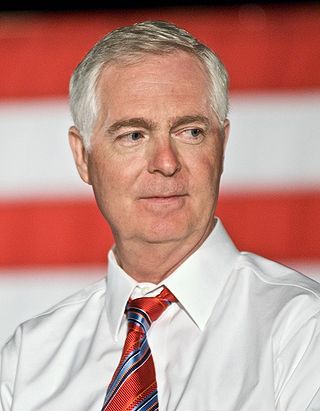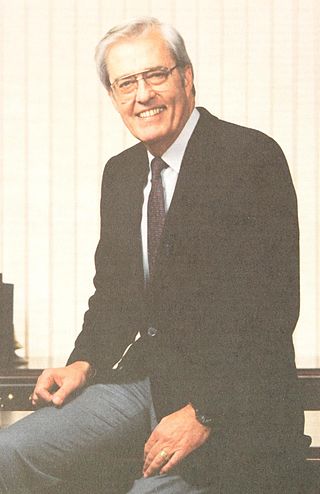
Richard A. Vinroot is an American politician and attorney from Charlotte, North Carolina. He served as the 52nd Mayor of Charlotte from 1991 to 1995. Vinroot ran unsuccessfully for Governor of North Carolina in 1996, 2000 and 2004. The City of Charlotte's Richard Vinroot International Achievement Award is named in his honor.

Michael Francis Easley is an American lawyer and politician who served as the 72nd governor of North Carolina from 2001 to 2009. He is the first governor of North Carolina to have been convicted of a felony. The conviction was later expunged by the Chief Judge of the Superior Court of Wake County. A member of the Democratic Party, Easley was North Carolina's second Catholic governor.

Patrick J. Ballantine is an American attorney and politician who was a Republican member of the North Carolina General Assembly, rising to become the Senate Minority Leader and the Republican Party's nominee for governor in 2004.

Fern H. Shubert is a former Republican member of the North Carolina General Assembly representing the state's thirty-fifth Senate district, including constituents in Mecklenburg and Union counties. An accountant from Marshville, North Carolina, Shubert served in the State House from 1994 to 1998 and again from 2000 to 2002. She served in the State Senate from 2002 to 2004, where she was the Republican whip.

William Wilfred Cobey Jr. is an American politician. A member of the Republican Party, he served one term in the United States House of Representatives for North Carolina's 4th congressional district from 1985 to 1987.

Elections to choose members of the North Carolina Council of State were held on Tuesday, November 2, 2004. The U.S. Presidential election, U.S. House election, U.S. Senate election, the North Carolina General Assembly election, and North Carolina judicial elections were all held on the same day.

United States gubernatorial elections were held on November 2, 2004, in 11 states and two territories. There was no net gain in seats for either party, as Democrats picked up an open seat in Montana while defeating incumbent Craig Benson in New Hampshire, while Republicans defeated incumbent Joe Kernan in Indiana and won Missouri after Bob Holden lost in the primary. These elections coincided with the presidential election.

The 2008 North Carolina gubernatorial election was held on November 4, 2008, coinciding with the presidential, U.S. Senate, U.S. House elections, Council of State and statewide judicial elections. Democrat Bev Perdue won the election. With a margin of 3.39%, this election was the closest race of the 2008 gubernatorial election cycle. This was the first time that the same party that was elected governor, won the concurrent presidential race since 1988. This was the first time Democrats did so since 1976.

United States gubernatorial elections were held on November 7, 2000, in 11 states and two territories. The elections coincided with the presidential election. Democrats gained one seat by defeating an incumbent in West Virginia. As of 2024, this remains the last gubernatorial cycle in which a Democrat won in Indiana.

Robert Byrd Jordan III was an American politician who served as the 29th Lieutenant Governor of North Carolina for one term (1985–1989) under Governor James G. Martin and who unsuccessfully ran for Governor of North Carolina in 1988.

The 2008 United States Senate election in North Carolina was held on Tuesday, November 4, 2008. The Senate election coincided with the presidential, U.S. House elections, gubernatorial, Council of State, and statewide judicial elections. Incumbent Republican U.S. Senator Elizabeth Dole ran for re-election to a second term, but was defeated by Kay Hagan.

The 2010 Illinois gubernatorial election took place on November 2, 2010. Incumbent Democratic Governor Pat Quinn was elected to a full term in office, having become governor in 2009 following the impeachment and removal of Governor Rod Blagojevich. Quinn was elected as the Democratic nominee, the Illinois Green Party nominee was attorney and 2006 nominee Rich Whitney, the Republican nominee was State Senator Bill Brady, the Libertarian Party nominee was Lex Green, and Scott Lee Cohen ran as an independent.

The 2012 North Carolina gubernatorial election took place on November 6, 2012, concurrently with the 2012 United States presidential election, U.S. House election, statewide judicial election, Council of State election and various local elections.

The 2008 North Carolina lieutenant gubernatorial election was held on November 4, 2008, as part of the elections to the Council of State. North Carolina also held a gubernatorial election on the same day, but the offices of governor and lieutenant governor are elected independently.

The 2000 North Carolina gubernatorial election was held on November 7, 2000. The general election was between the Republican nominee, former mayor of Charlotte Richard Vinroot and the Democratic nominee, state Attorney General Mike Easley. Easley won by 52% to 46%, and succeeded fellow Democrat Jim Hunt as governor.

The North Carolina Council of State election of 2000 was held on 7 November 2000, to elect the Council of State. The new Council of State was formally inaugurated on January 6, 2001.

The 2016 North Carolina gubernatorial election was held on November 8, 2016, concurrently with the 2016 U.S. presidential election, as well as elections to the United States Senate and elections to the United States House of Representatives and various state and local elections. Democratic state attorney general Roy Cooper won his first term in office, defeating Republican incumbent Pat McCrory.

The 1980 North Carolina lieutenant gubernatorial election was held on November 4, 1980. Democratic incumbent James C. Green defeated Republican nominee Bill Cobey with 53.20% of the vote.

The 2024 North Carolina gubernatorial election was held on November 5, 2024, to elect the governor of North Carolina. Democratic state attorney general Josh Stein won his first term in office, defeating Republican lieutenant governor Mark Robinson. He will succeed Democratic incumbent Roy Cooper, who was term-limited.

The North Carolina Council of State elections of 2024 were held on November 5, 2024, to select the ten officers of the North Carolina Council of State. These elections coincided with the presidential election, elections to the House of Representatives, elections to the North Carolina General Assembly and top state courts. Primary elections took place on March 5, 2024, for offices for which more than one candidate filed per party.















